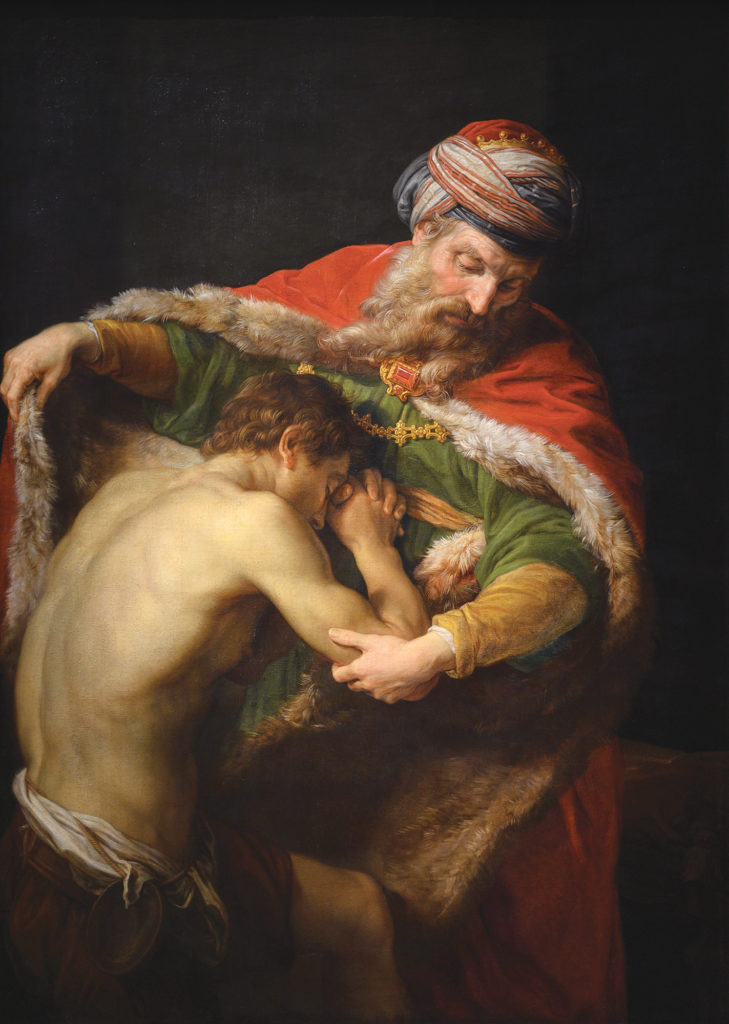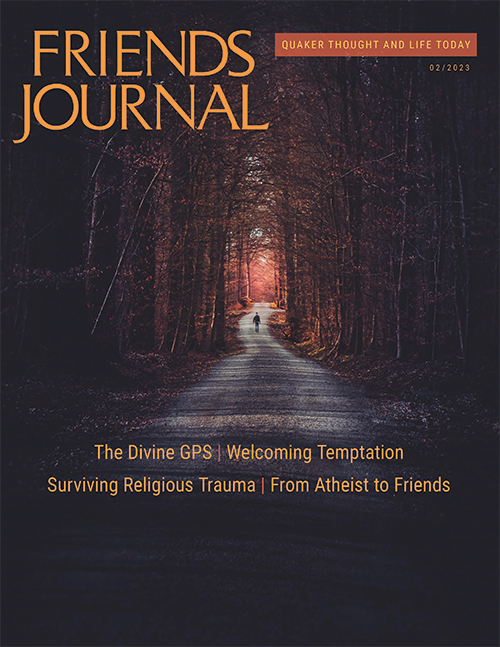How I Left an Abusive God
Hayden Hobby is featured in episode 4 of the Quakers Today podcast.
Family is such a complex and multifaceted social construct. When healthy and loving, it can lead to deep and flourishing relationships, but when broken, it can destroy you. No family is perfect, but while growing up, mine was good; my parents were both present and caring, and I know that they both wanted the best for me. I didn’t grow up with an abusive father, but, unfortunately, I did grow up with an abusive god.
I was raised in a hyper-conservative, Evangelical Christian tradition that believes sin deserves severe and eternal punishment, and that Jesus bore the punishment, wrath, and abandonment of God that my sins deserved. I was taught that no matter how good I thought myself to be, I deserved hell just for existing, and had it not been for Jesus’s death, that’s exactly what I would get. The resulting religious trauma that I sustained from this backward theology as a child and young adult wasn’t physical but it was emotional and psychological. Like most forms of trauma, it was still the result of violence.
As a result, I spent a lot of formative years trying to somehow hold and understand the paradox that God loved me and wanted to spend eternity in heaven with me but would just as quickly damn me to eternal hellfire for not believing in Jesus. That’s a big contradiction to attempt to hold as a 13-year-old, and eventually my faith broke like a wishbone.
I got lucky because the longer side of that wishbone was, fortunately, in favor of the God who loved me. At the same time, though, I watched so many of my high school friends collide with the real world and either retreat deeper into fundamentalism or let go of their belief in God entirely. My brother let go, and that really scared the hell out of me because I understood his decision. I also wanted to run far and fast from any version of God whose supposed “love” involved brutal violence and torture.
Nobody wants a God pulled apart like a turkey bone, but that’s what this distortion of Christianity has forced upon us: an angry and violent God, the Father on one hand and a loving and docile Jesus on the other. And in the middle is a broken and traumatized child of divine divorce, running from an angry and abusive god.
In Luke 15, Jesus tells a story about a father and his two sons. The oldest is loyal and responsible, serving his father dutifully and diligently, but the youngest, in an act of profound rebellion and disrespect, demands the inheritance he has coming and leaves his father’s house. The younger son takes his fortune and spends it all on a lavish life of pleasure and debauchery, eventually finding himself depleted of all wealth and dignity, living with pigs and longing to eat the slop that they’re fed. In the New International Version translation, Jesus says:
When he came to his senses, [the son] said, “How many of my father’s hired servants have food to spare, and here I am starving to death! I will set out and go back to my father and say to him: ‘Father, I have sinned against heaven and against you. I am no longer worthy to be called your son; make me like one of your hired servants.’” So he got up and went to his father.
Nobody wants a God pulled apart like a turkey bone, but that’s what this distortion of Christianity has forced upon us: an angry and violent God, the Father on one hand and a loving and docile Jesus on the other.
To make an important point, I’m going to reimagine and tell this story in a slightly different way, which, in the end, will have dire consequences for its characters. According to my old theology of a retributive God, the next part of the story should have unfolded like this:
Upon arriving, the father of the young, rebellious son stood sternly at the gate. “So, you’ve decided to return, have you?” he scolded through terse lips, arms folded and eyes aflame.
The son felt his heart drop; panic clenched his chest. Falling to his knees, with head bowed, he said, “Father, I have sinned against heaven and against you. I am no longer worthy to be called your son; please pardon me that I might live as your slave and eat the scraps from your table, for even that would be better than the squalor I have known of late.”
The father squinted at his younger son, his eyes noticing every rip and tear of his tattered, mud-stained clothes. At last, he said, “I will let you return to my house, but only because of your brother.”
The younger son looked up in confusion. “My brother? What has he to do with my situation?”
“When you left,” his father said, “I vowed that you would never again enter my house and that I would torture and kill you brutally if you ever showed your face here again. Your brother, however, loving you very dearly, said, ‘Father, do not do this thing to your son, but if your righteous anger must be poured out, let it fall on me and not my brother.’ He would not be persuaded otherwise and thus took the punishment you deserved so that you might be welcomed back into my house.”
Of course, this is not how the actual, biblical story unfolds in Luke 15. In the true account of the parable, Jesus says:
While [the son] was still a long way off, his father saw him and was filled with compassion for him; he ran to his son, threw his arms around him and kissed him.
The son said to him, “Father, I have sinned against heaven and against you. I am no longer worthy to be called your son.” But the father said to his servants, “Quick! Bring the best robe and put it on him. Put a ring on his finger and sandals on his feet. Bring the fattened calf and kill it. Let’s have a feast and celebrate. For this son of mine was dead and is alive again; he was lost and is found.”
I’ve known the story of the Prodigal Son for most of my life, and at no point would I have agreed with the altered telling of the story. However, any version of God that requires violent punishment to atone for sin is the father of that first, altered story. Being told to trust and believe in a God who does that to his son is damaging, and I’ve spent years trying to overcome the harm that it caused me. I continue to see its effect in instances such as my experience of severe anxiety from reading sermon notes. For this reason, I believe that for the White, Western, Evangelical church to move forward, we must come to terms with the damage that a God of capital punishment creates. We have to acknowledge that this way of understanding God has damaged individuals, families, and our nation, and we must offer the hurting children of this divine divorce something other than a savior who “bore the wrath reserved for me.”
I refuse to trust or believe in an angry, petty, and vindictive god, but this doesn’t mean that I want to believe in a God who is indifferent to the brokenness of our world. I don’t want a God who lets sin run rampant and does nothing about evil, but I also don’t want a God who solves the problem of violence with more violence. I want a God of power in weakness, victory in sacrifice, and justice in restoration. I want a God who fixes the broken world around me but not through punishment, not through penal substitution. I want a God whose wrath and righteous anger will always distinguish between the one controlled by Sin and Sin itself.

The Return of the Prodigal Son (1773), oil on canvas, by Pompeo Batoni; Kunsthistorisches Museum in Vienna, Austria.
Our Black sisters and brothers in faith are much more well-equipped to understand and process the wrath of God than we White Christians are. According to writers and thinkers like theologian James Cone, the wrath of God is crucial to the Black church. Because of the oppression and exploitation Black people have experienced in the past and present, the Black church’s focus is outward on the oppressor and evildoer rather than inward on the self. The Black church knows where God’s wrath should be and is directed: not at themselves but at the powers and institutions that perpetuate violence, oppression, hatred, and marginalization. To people who have firsthand experience with these sinful powers—slavery, segregation, lawless public execution, mass incarceration, and endless police brutality—God’s righteous anger and wrath are a source of hope—hope that someday God will right all wrongs and not let the oppressed suffer forever under the hands of the wicked.
Who we perceive God to be drastically influences the way that we live our lives. In the parable of the talents in Matthew 25, a man goes on a journey and leaves his servants with shares of his property: one with five talents, the second with two, and the last with one. The first two go and invest their talents, making more for their master when he returns, but the other servant “went and dug in the ground and hid his master’s money.” When confronted, the servant says, “Master, I knew you to be a hard man, reaping where you did not sow, and gathering where you scattered no seed, so I was afraid, and I went and hid your talent in the ground. Here, you have what is yours.” Unlike the others, this servant receives very harsh treatment from his master who takes away his talent and gives it to the one who now has ten. Jesus concludes this parable by saying, “to everyone who has will more be given, and he will have an abundance. But from the one who has not, even what he has will be taken away.”
I want a God of power in weakness, victory in sacrifice, and justice in restoration. I want a God who fixes the broken world around me but not through punishment, not through penal substitution. I want a God whose wrath and righteous anger will always distinguish between the one controlled by Sin and Sin itself.
One of the main conclusions to be drawn from this parable is the importance of capitalizing on the gifts God gives you. However, I think another equally important conclusion may be drawn about how our perception of God influences our actions and God’s perceived reactions. The “wicked” servant in this parable chooses not to invest his master’s money out of fear because he knew him to be a “hard man.” When we think of God as hard or strict, we will always bury the gifts that God gives us, afraid of the anger that losing them might prompt. However, like the master in the parable, the “God” who prompts fear will not be happy with our response, and any hardship we endure will inevitably be seen as a punishment for our lack of faith. If however, we’re able to see ourselves as those who have received the most, we may begin to understand the fearless servant who invests the gift of faith, knowing that regardless of the outcome, it’s not punishment that awaits but a joyful welcome of “well done, my good and faithful servant.” If we can see ourselves as beloved daughters and sons, welcomed home by a loving father, then, just maybe, we can start to find healing for the children of divine divorce and all get to know the True God whose perfect love casts out fear (1 John 4:18).







How blessed I was to be raised in a family where God is an protector and an agent of love.
It’s not about the kind of God *we* want, it’s about the kind of person *God* wants.
The parable of the Prodigal Son perfectly illustrates the relationship of our loving God with His/Her loving child. The prodigal son did not return saying, “I am not with sin, I deserve more of your generosity. The problem is with all the evil institutions and others.” First, he *returns*. Second he has learned in his gut, and confesses that he was wrong. Third, he humbly asks his father for the minimum required for life. Fourth, he accepts his father’s grace.
Evil in the world and God’s handling of it is a mystery. When Job complained about the world, God blessed him with a question (which is also the answer): “Where were *you* when I created the heavens and the Earth?”